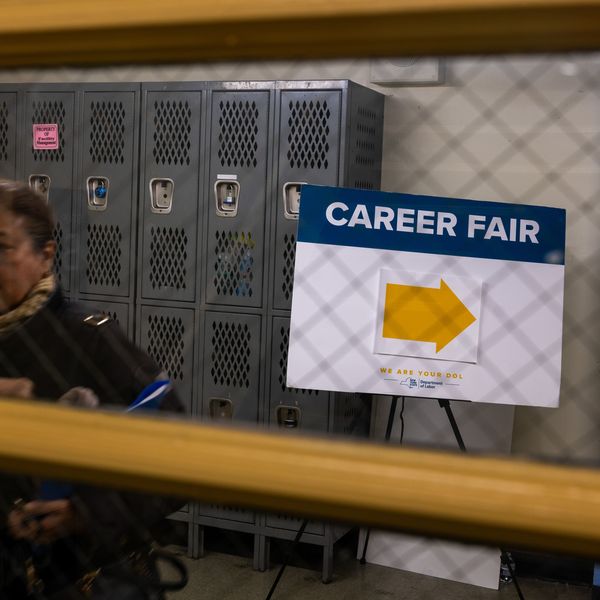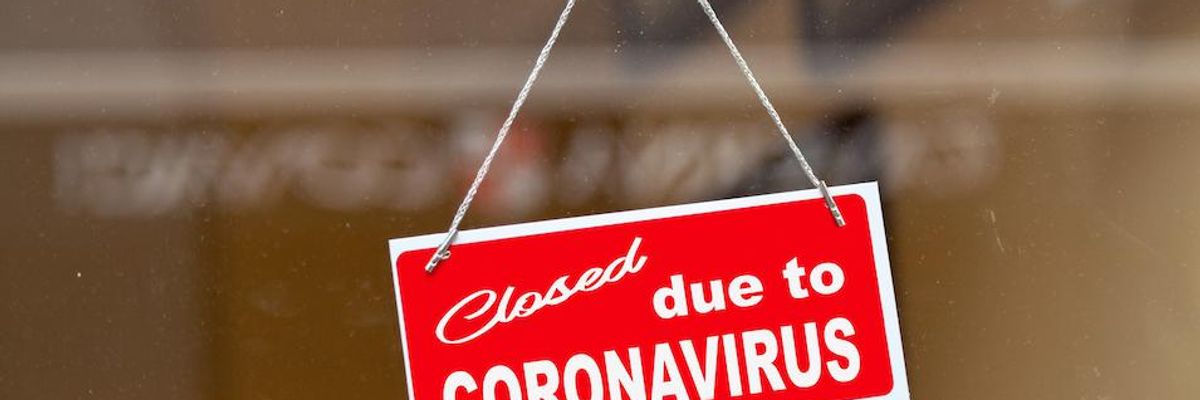As unemployment claims spike across the U.S. due to the coronavirus outbreak, economists and progressives are warning that the worst is yet to come and only an unprecedented economic stimulus can offset the effects of a major recession.
"The increase of 70,000 last week was slightly more than the increase of 61,000 due to Hurricane Harvey in the week ending September 2, 2017," Economic Policy Institute director of policy Heidi Shierholz wrote Thursday. "But today's hurricane-sized increase is nothing compared to what we can expect in coming weeks."
Shierholz added that while the stimulus package passed Wednesday by Congress and signed by President Donald Trump was a good first step, more action is needed.
"Policymakers should quickly pass a big fiscal stimulus package," wrote Shierholz. "This 'phase three' package should finance a sizable amount of household consumption (including through a major expansion of unemployment insurance), give fiscal aid to state governments, provide a payroll tax credit to businesses to not lay off workers, ramp up direct government purchases of things like medical equipment to help fight the virus, and make sure the duration of all measures to address the coronavirus economic shock are determined by economic conditions, not arbitrary timelines."
Economist and New York Times columnist Paul Krugman noted that the spike in claims already exceeded any week from the 2008-2010 recession and echoed Shierholz's warning that next weeek's numbers would be worse.
As Slate reported, the surge in claims is a direct consequence of the coronavirus outbreak and the disease's effect on the service industry:
These numbers are shocking but not surprising. The entire leisure and hospitality sector, which employs 16.9 million people, or about 10 percent of the entire labor force, is going into hibernation, as Americans avoid bars, restaurants, and travel, and states and cities begin to order establishments closed. Treasury Secretary Steve Mnuchin reportedly told Republican senators on Tuesday that, unless they passed a massive stimulus package, the country could face 20 percent unemployment, a number last seen in the Great Depression. He might be exaggerating, but given the particular contours of this crisis, which is essentially gutting the services industry, it's not an entirely crazy thought.
The shock of the global pandemic on the U.S. economy is likely to be felt for months. Layoffs across the country are increasing as companies face a national economy with dried up demand and a lack of consumer spending.
According to the New York Times, the coronavirus' impact on the economy could be far worse than already predicted as "the damage looks likely to be much deeper and longer lasting than seemed possible even a week ago."
The Times added that the crisis is leading to a political consensus on using massive direct cash payments to stimulate the economy:
With striking speed, Democrats and Republicans in Washington have embraced proposals for cash payments to Americans to help offset the economic damage. On Tuesday, President Trump endorsed the move, after previously pushing for a payroll-tax cut instead.
Unemployment benefits, as Dig Left researcher Andrew Perez pointed out, are insufficient to meet the scope of the crisis--and that efforts from Democratic Party leaders like Senate Minority Leader Chuck Schumer (D-N.Y.) to use refundable tax credits to help were unlikely to do much.
"Unemployment insurance is $275 a week in some states," said Perez.



